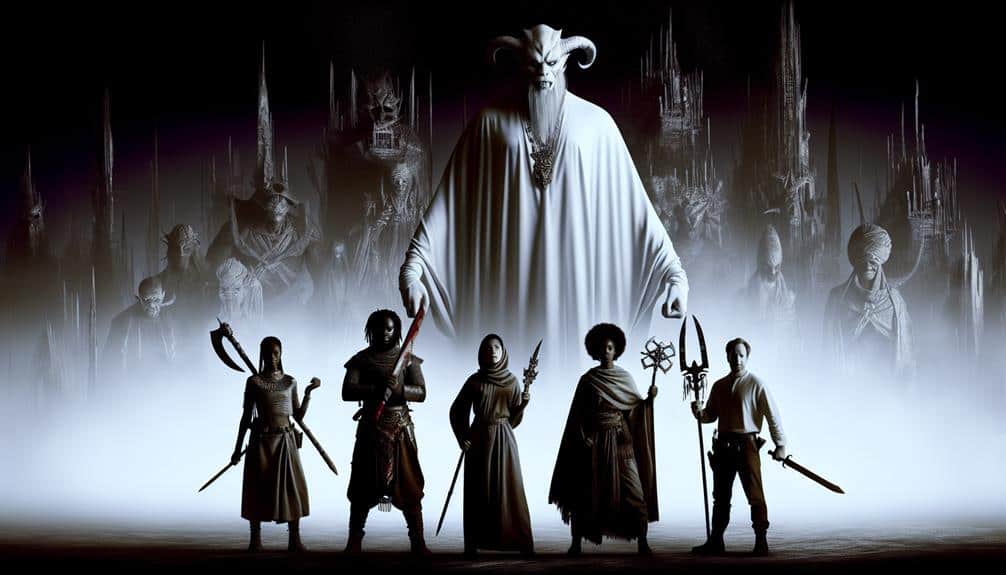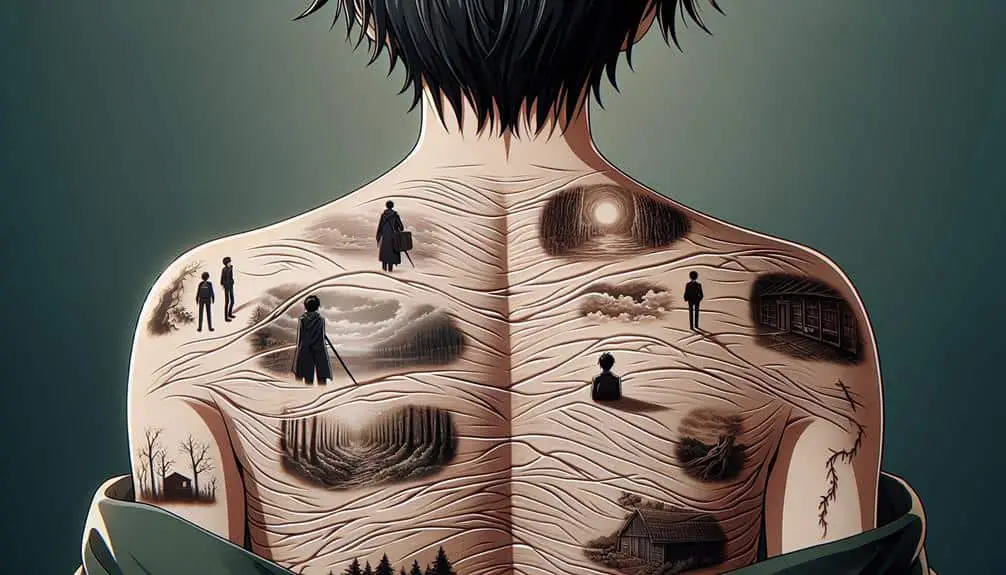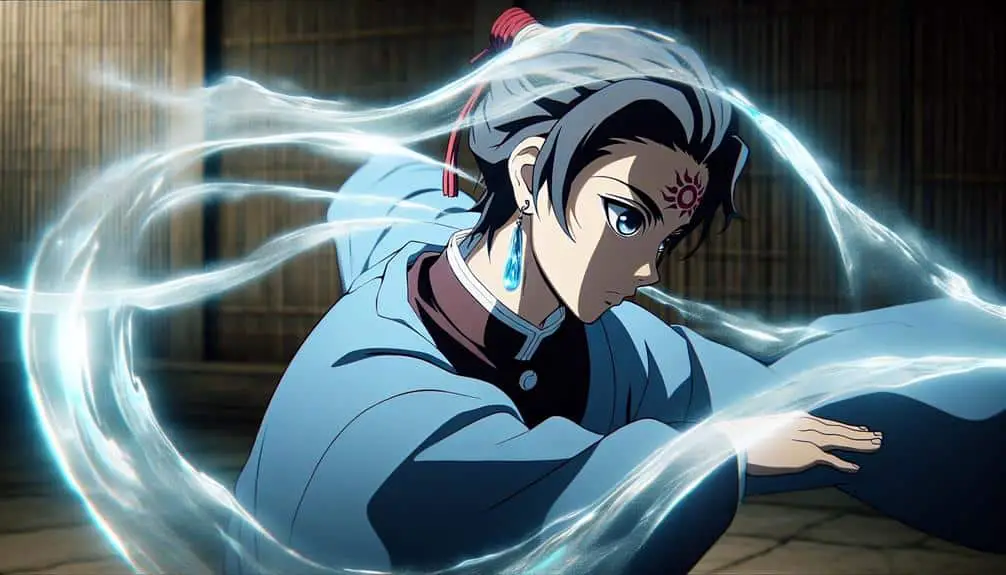Dive deep into Kibutsuji Muzan's impact on Demon Slayer to uncover a tale of manipulation and power struggles that drive the narrative's core. Muzan's origins and twisted desires set the stage for chaos. His influence shapes demons into formidable beings, binding them to his will. Through psychological warfare, he disrupts the Demon Slayer Corps, testing their resolve. Muzan's legacy is one of treachery, adding complexity to the plot. Even after his downfall, his impact lingers, creating a power struggle within the demon hierarchy. Explore how Muzan's enigmatic character leaves a lasting mark on the series.
Key Points
- Muzan's manipulation tactics drove the plot forward with treachery and deceit.
- Characters were tested and broken, showcasing twisted power dynamics.
- Muzan's defeat led to a power struggle in the demon hierarchy.
- His legacy of fear lingered, impacting themes of resilience and recovery.
- The aftermath explored redemption post-Muzan's downfall, highlighting the series' conclusion.
Kibutsuji Muzans Origins and Motivations
Analyzing Kibutsuji Muzan's origins and motivations reveals the intricate layers of his character, shedding light on the driving forces behind his malevolent actions in Demon Slayer. Muzan's mysterious past is a pivotal element in understanding his character. Born a human, his transformation into a demon not only granted him immense power but also twisted his desires into something dark and insatiable.
Delving into Muzan's origins exposes a tale of tragedy and despair, providing a glimpse into the events that may have shaped his malevolent inclinations. His mysterious past, shrouded in shadows and secrecy, hints at a deeper complexity beneath his seemingly ruthless exterior.
Understanding Muzan's twisted desires is essential to comprehending his actions throughout the series. His insatiable thirst for power and dominance stems from a deep-seated darkness within him, driving him to commit unspeakable atrocities without remorse.
Unraveling the enigma of Muzan's motivations is key to deciphering the intricate web of his character, showcasing the depth of his malevolence and the darkness that lurks within.
Transformation of Demons by Muzan
Muzan's influence extends beyond his own malevolent actions in Demon Slayer through the transformative power he wields over other demons, shaping them into formidable beings with dark and twisted purposes. By bestowing demons with his blood, Muzan initiates a drastic metamorphosis that not only enhances their physical abilities but also corrupts their essence, altering their personalities and propelling them towards a path of destruction. This demon transformation isn't without consequences, as it binds the demon to Muzan's will, creating a complex web of manipulation and dependency.
Muzan's power over demon transformation is a proof of his unparalleled authority within the demon world. Through this process, he not only fortifies his ranks but also guarantees unwavering loyalty from those he transforms. The consequences of this manipulation are extensive, as the demons lose their autonomy and become mere extensions of Muzan's malevolence, perpetuating a cycle of darkness and despair. The intricate nature of Muzan's influence through demon transformation highlights his insidious strategic prowess and the insurmountable challenges faced by the Demon Slayer Corps.
Muzans Influence on Demon Slayer Corps
Influencing the Demon Slayer Corps, Muzan's manipulative tactics and strategic schemes have woven a complex web of challenges for the organization to navigate. Muzan's power and his understanding of the demon slayer hierarchy have greatly impacted the dynamic within the Corps.
- Manipulation of Weaknesses: Muzan preys on individual weaknesses within the Demon Slayer Corps, exploiting vulnerabilities to sow discord and confusion.
- Strategic Targeting: Utilizing his immense power, Muzan strategically targets key members of the Corps, causing disruption and disarray in their ranks.
- Undermining Leadership: Muzan's influence reaches even the highest echelons of the demon slayer hierarchy, undermining leadership and creating distrust among comrades.
- Psychological Warfare: Through psychological warfare and subtle manipulation, Muzan instills fear and uncertainty, eroding the morale and unity of the Demon Slayer Corps.
Muzan's insidious influence permeates every level of the organization, posing a formidable challenge that the Corps must overcome to maintain its strength and purpose in the face of such a cunning adversary.
The Legacy of Muzan in Demon Slayer
Muzan's dark shadow continues to loom large over the world of Demon Slayer, leaving a lasting imprint on its characters, conflicts, and overall narrative trajectory. His manipulation tactics were a central force driving the plot forward, showcasing his ability to orchestrate chaos with precision. Muzan's hidden agenda, shrouded in mystery and malevolence, added layers of complexity to the narrative, keeping both the characters and the audience on edge.
The legacy of Muzan in Demon Slayer is one of treachery and deceit, as his influence seeped into every corner of the story, leaving a trail of devastation in his wake. Characters were tested and broken by his cunning schemes, highlighting the depth of his impact on their development. The conflicts that arose due to Muzan's actions weren't merely physical but also psychological, delving into the darker aspects of human nature under his manipulation.
In essence, Muzan's legacy in Demon Slayer is one of twisted power dynamics and psychological warfare, showcasing the lasting effects of a villain whose reach extended far beyond his physical form.
Muzans Final Impact on Series
With his demise looming, the repercussions of Kibutsuji Muzan's actions culminated in a finale that reverberated throughout the series, reshaping its very core. Muzan's downfall and defeat marked a pivotal moment in 'Demon Slayer,' leaving a lasting impact on both characters and readers alike.
Here's how Muzan's final actions influenced the series:
- Redemption Arcs: Characters previously entwined with Muzan's darkness sought redemption, showcasing the power of growth and change.
- Power Vacuum: Muzan's defeat created a void in the demon hierarchy, leading to power struggles and new dynamics among the remaining demons.
- Legacy of Fear: Despite Muzan's demise, his legacy of fear lingered, affecting characters who'd faced his terror firsthand.
- Themes of Resilience: The series explored themes of resilience and recovery post-Muzan, emphasizing the strength needed to rebuild in the aftermath of such darkness.
Muzan's final impact on 'Demon Slayer' highlighted the complex aftermath of a villain's downfall, delving into the intricacies of rebuilding a world shattered by his actions.




